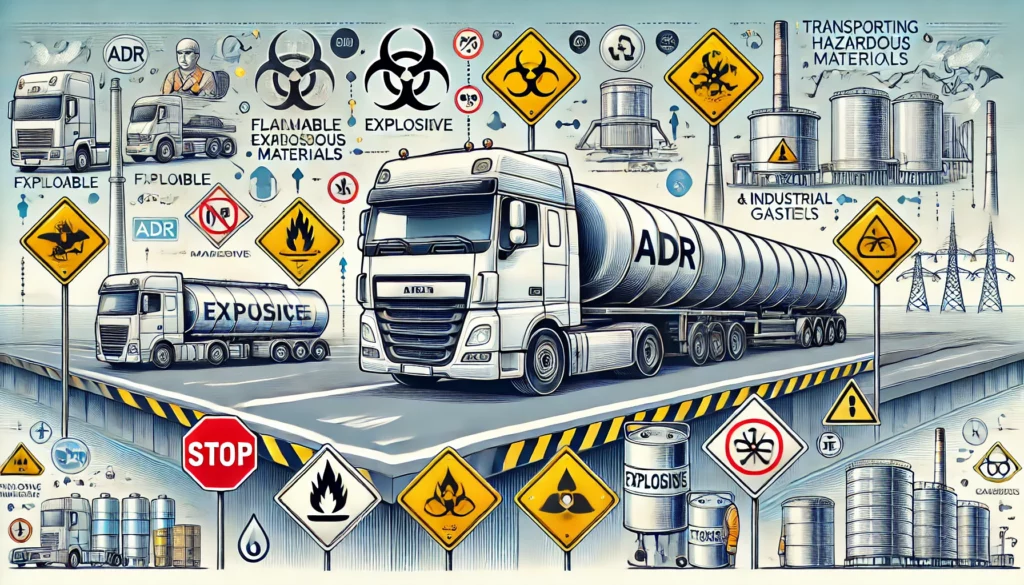What is ADR? Everything you need to know about the transport of dangerous goods (ADR Convention)
The ADR is an international convention on the carriage of dangerous goods by road, which regulates the safe transport of materials that potentially endanger life and the environment. The ADR agreement, drawn up in Geneva on September 30, 1957, is the basis for the transportation of hazardous materials throughout Europe.
Definition and history of the ADR agreement
The ADR Convention (Accord européen relatif au transport international des marchandises dangereuses) is a comprehensive set of regulations governing the transportation of hazardous materials and objects. Poland ratified it in 1975, and ADR regulations are revised on a biennial basis to ensure the highest safety standards in transportation. The International ADR Convention was created in response to the growing need to regulate the transportation of potentially hazardous materials by road.
Key provisions of the ADR Convention
Contract provisions ADR specifies in detail the conditions for the transport of individual dangerous goods. Specialized transportation Materials such as inflammable or explosive require special attention and adherence to strict safety standards. The ADR Convention regulates not only the carriage itself, but also all aspects of transport preparation and security.
Scope of goods covered by the ADR agreement
International road transportation involves a variety of hazardous materials, including:
- Explosives (Class 1)
- Flammable substances
- Toxic materials
- Transport in a tanker of special substances
- Corrosive and corrosive materials
- Technical and industrial gases

How to obtain an ADR certificate?
Any driver engaged in the transportation of dangerous goods by road must have a valid ADR certificate. To obtain one, one must:
- Complete the appropriate ADR course
- Pass the exam to complete such a course
- Draw up the required form
- Meet additional safety requirements
ADR training and certification
ADR courses are conducted by certified training centers, which must meet the requirements set by the regulation of the Minister of Transport. The training program includes both theoretical and practical parts, focusing on safety in the road transport of dangerous goods.
The role of the ADR advisor
A safety advisor for the transportation of Class 1 and other dangerous goods by road plays a key role in ensuring compliance with regulations. A decree of the Minister of Transportation, Construction and the Maritime Economy specifies detailed requirements for their qualification.
Documentation required for ADR transport
The transportation of hazardous materials requires comprehensive documentation, including:
- Shipping document
- Written safety instructions
- ADR driver certificates
- Certificates of approval of a vehicle for the transport of certain dangerous goods
- Forms and certificates required by ADR regulations
Changes to ADR regulations for 2024
In 2024, new regulations come into force for the transportation of goods dangerous. These regulations have been updated in accordance with the latest safety standards in road transportation. The ADR agreement regulates more and more aspects of transportation, adapting to technological developments and new challenges in road transportation.
Requirements for vehicles and equipment
ADR transportation requires specialized vehicle equipment, including:
- Cargo security systems
- Appropriate signage
- Fire protection equipment
- Personal protective equipment
International transport of dangerous goods
Vehicles carrying hazardous substances must be marked with standardized ADR plates.
Our company ensures full compliance with the requirements of international road transport of dangerous goods. In international transportation, it is particularly important to comply with the regulations for the transportation of hazardous materials in different countries.
Specific requirements for different ADR classes
The transportation of Class 7 dangerous goods by road requires special precautions and additional permits. Similarly, the transportation of Class 1 explosives is subject to special safety procedures.
It is worth noting that these regulations do not apply to vehicles belonging to the armed forces of the Republic of Poland, for which separate regulations apply.
Inspections and supervision of ADR shipments
The transportation of dangerous goods is subject to regular inspections by authorized services. This applies to both documentation and the technical condition of vehicles and cargo security.
Useful links:
- World Health Organization - Safety Guidelines
- European Environmental Agency
- United Nations Economic Commission for Europe
How to prepare for an ADR course?
- Read the official Polish version of the regulations
- Study the terms and conditions of transporting individual goods
- Learn about the requirements for transportation activities
- Review the precautions associated with the transportation of hazardous materials
- Learn about the changes in ADR regulations
- Prepare for the exam with the help of experienced instructors
The ADR regulates the transport aspect of the carriage of hazardous materials in English and French, and the United Nations Secretary-General oversees legal relations between participating countries. It contains regulations governing all aspects of the safe transportation of dangerous goods by road, from substance classification to packaging requirements and personnel training.







